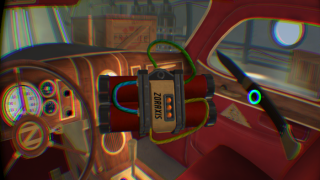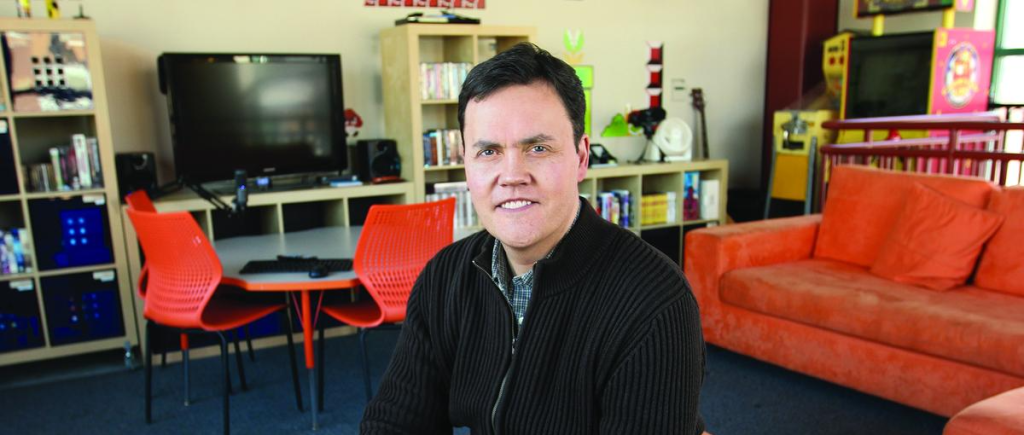Game designer Jesse Schell is an industry lifer, and a self-described VR-aholic. At first glance he appears to be a caffeine-aholic because he brings more energy and enthusiasm than a Starbucks barista to every conversation about virtual reality.
The affable Schell has worn many hats in the gaming industry and is part of the one percent who actually has a polished dossier to talk about VR. He earned a masters in computer networking and virtual reality – in 1994. He’s since authored books, headed international game developer associations, done Ted Talks and served as creative director of the Walt Disney Imagineering Virtual Reality Studio.
Twenty-two years after getting his master’s at Carnegie Mellon, he now teaches students how to build virtual worlds at his alma mater. And, oh by the way, he’s the CEO of the Pennsylvania-based game studio Schell Games for the last 14 years where they’ve already released VR titles like the award-winning I Expect You to Die for the soon-to-be-released Oculus Rift.
Schell says he has more educational and transformational games in development because VR is finally here to stay. “VR headsets will permanently stay in the market from 2016 and beyond – forever,” Schell told [a]listdaily. “Maybe the Best Buy it’s sold in will go away, but VR won’t. People are going to want it, and pay for it. Virtual worlds promise utopia.”
Schell joined [a]listdaily to discuss tech’s hottest topic.
What made you so passionate about virtual reality?
I’m always excited about how you can use media and new technologies in order to help people transform themselves for the better. VR is just one of those technologies that is going to do incredible wonders, to break down barriers in education and deliver world-class educational experiences to everyone in the world – not to mention what it could do for empathy. It’s one thing to see about a situation on television. It’s a whole other thing to be in it and have it feel real all around you. One of the things that’s really important is that VR is going to bring us closer together as species, as a culture, because it’s going to allow us to go places we’ve never been able before.
What are some of the momentum-shifting events that need to happen for VR to fully take off?
People need to believe in it. Most people don’t believe in it because they haven’t experienced good VR. They’ve either had no VR experiences, or the weaker experiences from the past. The technology recently has crossed a threshold that can’t be shown on television or described with words. People have to try it, and feel it to see how powerful it is. When you have technologies like that, they somewhat lead to slow adoption. We saw the same thing with DVR … 2016 is going to be a lot of (people saying) ‘have you seen this’ and ‘have you tried that.’ There’s going to be a lot of talk, particularly centered around Christmas season.
How are gamers in the epicenter of the VR movement? How do you market them?
Yes, gamers are definitely going to be the ones most passionate about it. Gamers are already excited about new kinds of virtual worlds. They want something new, better and exciting, and they’re willing to pay for it. As a result, they are going to be the early adopters. They’re going to be at the heart of it in the beginning.
How do you bridge the real and virtual gap for enhanced experiences with the current projects you’re working on?
There’s so much to figure out in terms of how to bring these things into the creative space. We do things all over the map with different ways to bridge between physical and virtual reality. We do everything from stuff that’s kind of a pure VR play to things that are like museum and theme park experiences, and even with interactive toys. We’re actually doing an interactive one now that lets you build molecules with physical toys, and then you use your app to create an augmented reality experience that lets you figure out what molecules you’ve built. We’re doing everything from that to also working with the Google Tango and a Jenga experience. We’re just so excited because there’s so many things happening on so many different fronts.

What did it mean to win the “Inspire Award” at inaugural Vision Summit for your VR game I Expect You to Die?
It’s a game we’re excited about. Personally, I’m so excited what’s happening in VR right now. I’ve been working on VR for over 20 years, and to have it finally come into the mainstream, and to take everything we’ve learned over all that time and put it into experiences is just absolutely thrilling.
If there’s one piece of advice you could share with VR content creators, what would it be?
My main advice would be ‘don’t copy what came before.’ Don’t just say, ‘I’m going to take my favorite game from consoles growing up’ and just make it in VR because it’s unlikely to work very easily. You want to figure out what the medium is actually good at, and build around it. You can figure that out partly with experiment, but look back at the 30 years of experimentation that’s already been done.
You predicted Madden will have a VR edition to the game by 2020. How will sports experiences carry over into VR?
It’s a really big question – exactly how sports are going to blend into VR, certainly. We are going to see a lot of casual sports games – think bowling. We’re going to see a lot of stuff like that in the beginning as people are experimenting. Part of what’s exciting about sports is the feeling of being on the field with famous athletes. VR is going to give that feeling like we’ve never had before. The question comes down to: How much are people going to want to have virtual interfaces or be actually involved in the process of throwing a ball or blocking a shot? There’s going to be a lot of experimentation that needs to be done, but I feel certain that being in the same space with athletes is going to be a huge draw. The problems are hard to solve, but people are going to tackle them. … The most important sports experience is going to be the broadcasts of live events.
Attending sporting events costs a pretty penny, and can sometimes be problematic in actually physically getting there. Can VR easily replace the in-person viewing experience?
Hardcore sports fans will spend huge amounts of money to follow and be near a team they care about. Take a look back into history … who bought the first big-screen TVs? It was sports fans. Sports fans buying high-end VR that’s going to make them feel like they are right there at the game is totally going to happen. Will it replace the live element? I’m doubtful that VR is going to steal that away, but it will complement it. I would argue that it would actually make you want to go in-person even more.

What will it take for VR to not be a flash in the pan? What does it need to overcome?
Isolation. When you put on the gear, it’s an incredibly isolating experience. We don’t really have a way right now for you and I to be sitting side-by-side, each put on our helmets, and each have a 360-degree experience and still have a social experience. We don’t know how that works yet. No one has cracked that nut. … And I haven’t seen anything even remotely close to it yet.
What are you teaching the current crop of students at Carnegie Mellon that will soon hit the work force?
I teach classes like ‘Building Virtual Worlds’ and ‘Game Design’ at the Entertainment Technology Center. What we really focus on there is interdisciplinary innovation. We take artists and engineers and put them on teams together and have them invent new things that they couldn’t have invented alone. We’re very careful to make sure the students are not focused on the technology of today. We try very hard to have them looking forward and to be working with technologies that are still coming out. If you can get in the habit of mastering it, you’re always going to be in place to make the biggest difference in the world.
Follow Manouk Akopyan on Twitter @Manouk_Akopyan.

